 Even if several multi-state legal challenges result in a federal court order directing Postmaster General Louis DeJoy to repair the damage wrought by his allegedly "illegal" sabotage of the U.S. Postal Service's mail delivery capabilities, absent significant additional funds, it's unlikely DeJoy could fully comply with that order.
Even if several multi-state legal challenges result in a federal court order directing Postmaster General Louis DeJoy to repair the damage wrought by his allegedly "illegal" sabotage of the U.S. Postal Service's mail delivery capabilities, absent significant additional funds, it's unlikely DeJoy could fully comply with that order.
The facts laid out in one of the recently filed cases and echoed in the others, along with subsequent developments, suggest that DeJoy was, at best, disingenuous when, in an August 18 formal statement [PDF], he claimed he was "suspending" his nationwide mail sorting, labeling and delivery changes until after the Nov. 3 Presidential Election.
The complaint describes how, pursuant to an Equipment Reduction Plan [PDF], Defendants removed, dismantled and/or destroyed 671 high-speed sorting and labeling machines that had a combined hundreds of millions of dollars in value. As a result, the States allege, "some major cities have already had their ability to sort mail reduced by hundreds of thousands of pieces of mail per hour." (Emphasis in original text).
On the same day that DeJoy issued his "suspension" statement, emails were submitted by Kevin Couch, the USPS Director of Maintenance Operations, informing Maintenance Managers that, irrespective of instructions from their plant managers, they must not reconnect or reinstall sorting machines that had previously been disconnected absent approval from USPS HQ.
Last Friday, while testifying before the U.S. Senate, DeJoy made it clear that he has "has no intention" of reinstalling the sorting machines, even as he claimed that election related mail would receive top priority from the Postal Service. Contrary to DeJoy's rosy predictions, however, the USPS's own Service Performance memo reflects a significant drop in overall performance which precipitated a USPS warning to 46 states that their deadlines for Vote-by-Mail ballots "might impede the timely delivery of mail-in ballots, possibly disenfranchising millions of voters"
While there's ample reason for a court to order reinstallation, absent significant additional USPS funding, which Trump opposes, it is doubtful that DeJoy could fully undo the damage even if he were ordered to do so.
VOTERS BEWARE: Do not be lulled into a false sense of security by DeJoy's "suspension" of changes at the USPS until after Election Day, or by his unsupported assurance that USPS can timely process and deliver every ballot. The wiser course, as laid out in our previously related article, is to deposit your mail-in ballots in secure, state-supplied drop-boxes (where available) or at designated drop-off locations. Check your local jurisdictions to learn what options may be available where you live. In some jurisdictions, voters can deposit their mail-in ballots at the polls either during early voting or on Election Day. In some jurisdictions, voters can link to election official websites to track the processing of their own ballots as well...
Non-discretionary duty
Last Tuesday, fourteen state Attorneys General --- from WA, CO, CT, IL, MD, MI, MN, NV, NM, OR, RI, VT, VA, WI --- filed a 120-page federal complaint [PDF]. In that case, State of Washington v. Trump, the States argue, in detail, that President Donald Trump, DeJoy and the USPS violated a multitude of substantive and procedural statutes, as well as several provisions of the U.S. Constitution.
Last Friday, five additional States, --- CA, DE, MA, ME, NC and the District of Columbia --- filed a separate federal lawsuit (Commonwealth of Pennsylvania v DeJoy), which names DeJoy, USPS Board of Governmor's Chairman Robert M. Duncan and the USPS, as Defendants.
Both State lawsuits were preceded by an August 17 federal complaint, filed by Mondaire Jones, a Congressional candidate, and a number of voters (Jones v. USPS). The complaints were filed in three different U.S. District Courts located in WA, PA and NY.
The analysis here is confined to State of Washington v. Trump, which charges that beginning in June and continuing through August 18, the USPS effectuated numerous nationwide "transformational" changes to mail delivery services without first seeking an advisory opinion from the Postal Regulatory Commission (PRC), as mandated by a federal statute. These actions deprived the States and other mail users of their statutory right to receive notice and an opportunity to appear at a PRC hearing in order to oppose those changes.
The States allege that, under federal law, 39 U.S.C. §3661, "Defendants" had a "non-discretionary duty" to request and obtain an advisory opinion from the PRC before instituting "a change in the nature of postal services which will generally affect service on a nationwide or a substantially nationwide basis."
Pursuant to the express terms of that federal statute, the PRC cannot issue that advisory opinion "until an opportunity for hearing on the record...has been afforded to the Postal Service, users of the mail, and an officer of the [PRC] who shall be required to represent the public interest."
By instituting nationwide changes that DeJoy himself described as "transformational", Defendants not only violated this statutory mandate but also acted ultra vires (beyond the scope of powers the USPS and the Executive Branch of the U.S. Government), according to the complaint. This, the States allege, warrants a finding by the court that Defendants' changes were "unlawful". It also warrants injunctive relief that prevents "Defendants from implementing the changes" and "vacature" --- essentially annulment of the changes that were illegally implemented.
The Defendants' actions, the States charge, are also at odds with the basic function of the USPS, as defined by 39 U.S.C. § 101(a). That basic function is "to provide postal services to bind the Nation together through the personal, educational, literary and business correspondence of the people." The USPS "shall provide prompt, reliable and efficient services to patrons in all areas and shall render postal services to all communities."
Constitutional violations
The States allege that Defendants, by seeking to prevent the States from conducting a vote-by-mail election, violated the Elections Clause, Article I, Section 4 of the U.S. Constitution.
"Defendants' actions on the eve of the 2020 election --- well after the States have established systems for voting using the Postal Service --- to no longer support the manner chosen by the States interferes with the States' right to set the 'Times, Places and Manner of holding Elections for Senators and Representatives'." The States add that Trump, DeJoy and the USPS overstepped "the limited role given to the Federal Government in modifying States' choices. The Constitution only permits Congress, not the Executive Branch, [to modify] States' choices."
The States also charge that the Defendants violated Article II, Section 1 of the U.S. Constitution, which governs the role each State has in selecting the members of the Electoral College. "All 50 States vest the right to vote for President in their people," the complaint explains. By seeking to interfere with mail-in voting, Defendants have impermissibly interfered with the States' exclusive right to appoint presidential electors "in such manner" as the States' Legislatures prescribed.
Citing a U.S. Supreme Court case, the States claim that Trump and DeJoy also violated the 10th Amendment, which the framers included in the Constitution so that States could "keep for themselves...the power to regulate elections."
On behalf of their citizens, the plaintiffs allege that the illicit sabotage of USPS mail delivery capabilities also violates the rights to Equal Protection and the foundational right of their citizens to vote.
Are some "transformational changes" irreversible?
The States claims that DeJoy's "transformational" changes to the USPS include:
DeJoy, according to the complaint, instituted a hiring freeze and nearly tripled States' vote-by-mail costs at a time when the States are reeling from economic losses associated with the COVID-19 pandemic. DeJoy also carried out an August 7 "Friday Night Massacre" by "reassigning or displacing twenty-three postal executives, including two executives overseeing day-to-day operations." He closed three of Washington State's five processing centers. Because of those closures, a letter mailed from one Yakima, WA business to another would have to first be routed to Seattle for processing before being returned to Yakima for delivery, the States allege --- this by a Postmaster General who claims the changes were made in the interests of cost savings and efficiency.
Over the past three decades the USPS has acquired a sophisticated automation capacity via the purchase of multiple, high-speed sorting machines. These include, according to the complaint, "Advanced Facer Canceller Systems, Delivery Bar Code Sorters, Automated Flat Sorting Machines, and Flat Sequencing Systems," that, on a national scale, have "the capacity to sort over 21 million pieces of mail per hour".
In the past, the USPS has spent a good deal of money to acquire automated labeling and sorting equipment. For example, in 2008 Siemens was awarded a $250 million contract to supply the USPS with 550 Advanced Facer Canceller Systems (AFCS). (See video below of an AFCS in action.) The AFCS, which apply postmarks, are especially critical in states that will only process and tabulate late arriving mail-in ballots that were postmarked on or before Nov. 3, the States warn.
DeJoy was confirmed by the Trump-appointed, GOP-majority Postal Servirce Board of Governors on May 6, but was not scheduled to take office until June 15. However, as observed by Michael Hiltzek of the Los Angeles Times, citing the Congressional testimony of David Williams, a former USPS Inspector General, by April, when Williams resigned his position as vice chair on the USPS Board of Governors, an ostensibly independent body, the Trump administration, particularly Treasury Steve Mnuchin, succeeded in politicizing the Board of Governors.
On May 15, between the time DeJoy was confirmed and took office, USPS produced "The Equipment Reduction Plan" (ERP) --- a plan that aspired to reduce the number of these automated labeling and sorting machines by 20%. The "target", the States allege, was to remove 969 machines by the end of the year. Defendants never sought an advisory opinion from the PRC before DeJoy began effectuating the removal of the machines.
The complaint exposes the wholesale deficiency in DeJoy's "suspension" announcement. He has already succeeded in removing 671 of these sophisticated machines, reportedly dismantling them entirely in many cases. As a result, the States note that "some major cities have already had their ability to sort mail reduced by hundreds of thousands of pieces of mail per hour." (Emphasis in original text). Citing the corresponding elimination of overtime, the States allege that "this change makes it a virtual certainty that a significant number of ballots received by USPS, mailed by voters in the time permitted by law, will not be counted."


Even if DeJoy now sought to do so, absent immediate Congressional and Presidential approval of additional USPS funding, it's doubtful that DeJoy could fully repair the damage wrought by this illicit mail slowdown scheme. In their complaint, the States, citing an Aaron Gordon article published by Motherboard, set forth an allegation that underscores the malicious nature of this illegal scheme, to wit: "Postal Service employees have reported personally witnessing machines costing millions of dollars 'destroyed or thrown in the dumpster'."
Any doubts on the validity of that allegation were eliminated on August 19, when Reporter Heather Walker of WOOD TV8 in Grand Rapids, MI displayed on Twitter the scattered remnants of expensive mail sorting machines, parts of which had been placed in a dumpster over the preceding week.
.@USPS GR Patterson location has pieces of the mail sorting machines out in the parking lot. @WOODTV pic.twitter.com/OuugjhTbfE
— Heather Walker (@_HeatherWalker) August 19, 2020
Video of an operating Advanced Facer Canceller System follows...
 Ernest A. Canning is a retired attorney, author, and Vietnam Veteran (4th Infantry, Central Highlands 1968). He previously served as a Senior Advisor to Veterans For Bernie. Canning has been a member of the California state bar since 1977. In addition to a juris doctor, he has received both undergraduate and graduate degrees in political science. Follow him on twitter: @cann4ing
Ernest A. Canning is a retired attorney, author, and Vietnam Veteran (4th Infantry, Central Highlands 1968). He previously served as a Senior Advisor to Veterans For Bernie. Canning has been a member of the California state bar since 1977. In addition to a juris doctor, he has received both undergraduate and graduate degrees in political science. Follow him on twitter: @cann4ing


 'Green News Report' 10/1/24
'Green News Report' 10/1/24
 The Predictable Horrors of Helene: 'BradCast' 9/30/2024
The Predictable Horrors of Helene: 'BradCast' 9/30/2024 Springfield Haitians Sue Trump, Vance, Musk et al over Defamation, Death Threats
Springfield Haitians Sue Trump, Vance, Musk et al over Defamation, Death Threats Sunday 'Protection Racket' Toons
Sunday 'Protection Racket' Toons Trump Weaponized Govt Against His Enemies, Vows to Do It Again: 'BradCast' 9/26/24
Trump Weaponized Govt Against His Enemies, Vows to Do It Again: 'BradCast' 9/26/24  'Green News Report' 9/26/24
'Green News Report' 9/26/24 The Climate and Economy Stakes of 2024: 'BradCast' 9/25/24
The Climate and Economy Stakes of 2024: 'BradCast' 9/25/24 Good News for Democracy in Nebraska, Arizona (Not Montana): 'BradCast' 9/24/24
Good News for Democracy in Nebraska, Arizona (Not Montana): 'BradCast' 9/24/24 'Green News Report' 9/24/24
'Green News Report' 9/24/24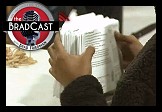 No, GA's New Rule Does NOT Mandate Hand-Counted Results: 'BradCast' 9/23/24
No, GA's New Rule Does NOT Mandate Hand-Counted Results: 'BradCast' 9/23/24 Sunday 'Not Going Back' Toons
Sunday 'Not Going Back' Toons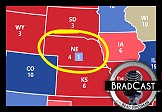 Losers' Stench: GOPers Gaming the Map to 270: 'BradCast' 9/19/24
Losers' Stench: GOPers Gaming the Map to 270: 'BradCast' 9/19/24 State A.G. and County Election Officials Square-Off Over Voter Registration in Texas
State A.G. and County Election Officials Square-Off Over Voter Registration in Texas 'Green News Report' 9/19/24
'Green News Report' 9/19/24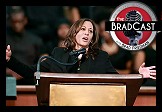 Winning Over White Evangelicals for Harris: 'BradCast' 9/18/24
Winning Over White Evangelicals for Harris: 'BradCast' 9/18/24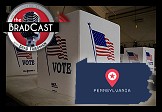 PA County Election Chief on 2024 Challenges: 'BradCast' 9/17/24
PA County Election Chief on 2024 Challenges: 'BradCast' 9/17/24 Trump Supporters Tell Us Why They Still Back Him: 'BradCast' 9/16/24
Trump Supporters Tell Us Why They Still Back Him: 'BradCast' 9/16/24 Debate Moderator Was Right: Trump Lost 2020 Challenges for Lack of Evidence
Debate Moderator Was Right: Trump Lost 2020 Challenges for Lack of Evidence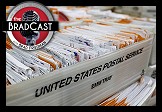 TX Vote Suppression; Officials Alarmed by USPS Failure: 'BradCast' 9/12/24
TX Vote Suppression; Officials Alarmed by USPS Failure: 'BradCast' 9/12/24 Harris Dominated Trump at Philly Debate: 'BradCast' 9/11/24
Harris Dominated Trump at Philly Debate: 'BradCast' 9/11/24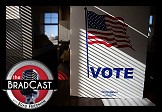 GOP Fights to Suppress Vote in Nebraska: 'BradCast' 9/10/24
GOP Fights to Suppress Vote in Nebraska: 'BradCast' 9/10/24 Cheneys Endorse Democrats; Trump Vows to Jail Everyone: 'BradCast' 9/9/24
Cheneys Endorse Democrats; Trump Vows to Jail Everyone: 'BradCast' 9/9/24
 VA GOP VOTER REG FRAUDSTER OFF HOOK
VA GOP VOTER REG FRAUDSTER OFF HOOK Criminal GOP Voter Registration Fraud Probe Expanding in VA
Criminal GOP Voter Registration Fraud Probe Expanding in VA DOJ PROBE SOUGHT AFTER VA ARREST
DOJ PROBE SOUGHT AFTER VA ARREST Arrest in VA: GOP Voter Reg Scandal Widens
Arrest in VA: GOP Voter Reg Scandal Widens ALL TOGETHER: ROVE, SPROUL, KOCHS, RNC
ALL TOGETHER: ROVE, SPROUL, KOCHS, RNC LATimes: RNC's 'Fired' Sproul Working for Repubs in 'as Many as 30 States'
LATimes: RNC's 'Fired' Sproul Working for Repubs in 'as Many as 30 States' 'Fired' Sproul Group 'Cloned', Still Working for Republicans in At Least 10 States
'Fired' Sproul Group 'Cloned', Still Working for Republicans in At Least 10 States FINALLY: FOX ON GOP REG FRAUD SCANDAL
FINALLY: FOX ON GOP REG FRAUD SCANDAL COLORADO FOLLOWS FLORIDA WITH GOP CRIMINAL INVESTIGATION
COLORADO FOLLOWS FLORIDA WITH GOP CRIMINAL INVESTIGATION CRIMINAL PROBE LAUNCHED INTO GOP VOTER REGISTRATION FRAUD SCANDAL IN FL
CRIMINAL PROBE LAUNCHED INTO GOP VOTER REGISTRATION FRAUD SCANDAL IN FL Brad Breaks PA Photo ID & GOP Registration Fraud Scandal News on Hartmann TV
Brad Breaks PA Photo ID & GOP Registration Fraud Scandal News on Hartmann TV  CAUGHT ON TAPE: COORDINATED NATIONWIDE GOP VOTER REG SCAM
CAUGHT ON TAPE: COORDINATED NATIONWIDE GOP VOTER REG SCAM CRIMINAL ELECTION FRAUD COMPLAINT FILED AGAINST GOP 'FRAUD' FIRM
CRIMINAL ELECTION FRAUD COMPLAINT FILED AGAINST GOP 'FRAUD' FIRM RICK SCOTT GETS ROLLED IN GOP REGISTRATION FRAUD SCANDAL
RICK SCOTT GETS ROLLED IN GOP REGISTRATION FRAUD SCANDAL VIDEO: Brad Breaks GOP Reg Fraud Scandal on Hartmann TV
VIDEO: Brad Breaks GOP Reg Fraud Scandal on Hartmann TV RNC FIRES NATIONAL VOTER REGISTRATION FIRM FOR FRAUD
RNC FIRES NATIONAL VOTER REGISTRATION FIRM FOR FRAUD EXCLUSIVE: Intvw w/ FL Official Who First Discovered GOP Reg Fraud
EXCLUSIVE: Intvw w/ FL Official Who First Discovered GOP Reg Fraud GOP REGISTRATION FRAUD FOUND IN FL
GOP REGISTRATION FRAUD FOUND IN FL


































